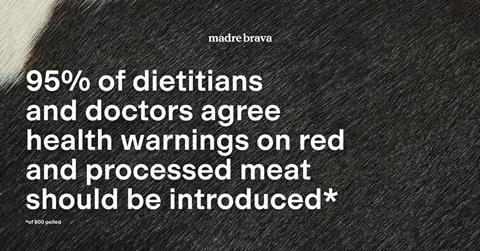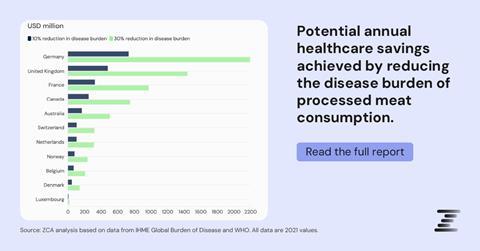Evidence of the health benefits of plant-rich diets is abundant, and the dangers of overconsuming meat are well-documented.
Advertorial by 
A recent survey shows that health professionals are convinced of the benefits of more plants, too. But this survey, and a new report on the economic consequences of meat overconsumption, suggest we should be pushing harder to reform a food system that is making people sick and costing us millions.
The poll, conducted for the food and climate advocacy organisation Madre Brava, showed overwhelming agreement about the deleterious effect of meat-heavy diets on public health. Nine in 10 of 600 doctors and dieticians polled across five European countries agreed that meat consumption exceeds healthy levels. The same proportion acknowledges these diets lead to increased spending on already stretched healthcare systems.
Many in our profession are concerned: more than 70 per cent say that the meat industry is trying to undermine the scientific evidence on the health impacts of red and processed meat, and almost 90 per cent believe large food companies exert too much influence over national food policy.
Perhaps most strikingly, 95 per cent of those polled thought red and processed meat should carry health warnings. It is no longer controversial to think that something that takes such a toll on our health when consumed in excess should carry information as to those harms.
New analysis from Zero Carbon Analytics lays bare the full extent of these harms, not only on our health but on our healthcare systems as well. Their research shows that reducing meat across high-income, high-consuming countries, including the United States, much of Europe, the UK, Australia and Canada, could release billions back into overstretched healthcare systems.
According to Zero Carbon Analytics, even a 10 per cent reduction in the disease burden from processed meat alone – achieved through dietary change – could free up an estimated USD 9bn (£6.68bn) a year, enough to fund almost 130,000 additional hospital nurses across the studied countries.
So overconsumption of meat is not only failing our patients, it is failing our healthcare system as a whole.
The system we have built to feed ourselves does not always have our best interests at heart. And while there is evidence that meat consumption in the UK has decreased over time, significant proportions of the population continue to overconsume it.
With recent polling suggesting rising meat consumption among young men, it is a stubborn and persistent problem that only serves the interests of the industry that profits from it.
Our NHS faces unprecedented financial pressures, yet we are failing to advocate for one of the most cost-effective, preventive health measures available to us: plant-rich diets.
We should be integrating evidence-based dietary advice into routine consultations, serving plant-rich diets in our hospitals and other healthcare settings and ensuring nutrition education featuring plant-rich diets becomes a central part of our healthcare training.
The evidence of harm is clear, the economic case is compelling, and our patients deserve better guidance.
By becoming vocal champions for plant-rich diets, we can simultaneously improve patient outcomes, reduce preventable disease burden, and strengthen the financial sustainability of our NHS. This is not radical activism – it is evidence-based medicine at its most impactful.
Dr Ashby is not connected with the sponsor of this opinion piece.






























